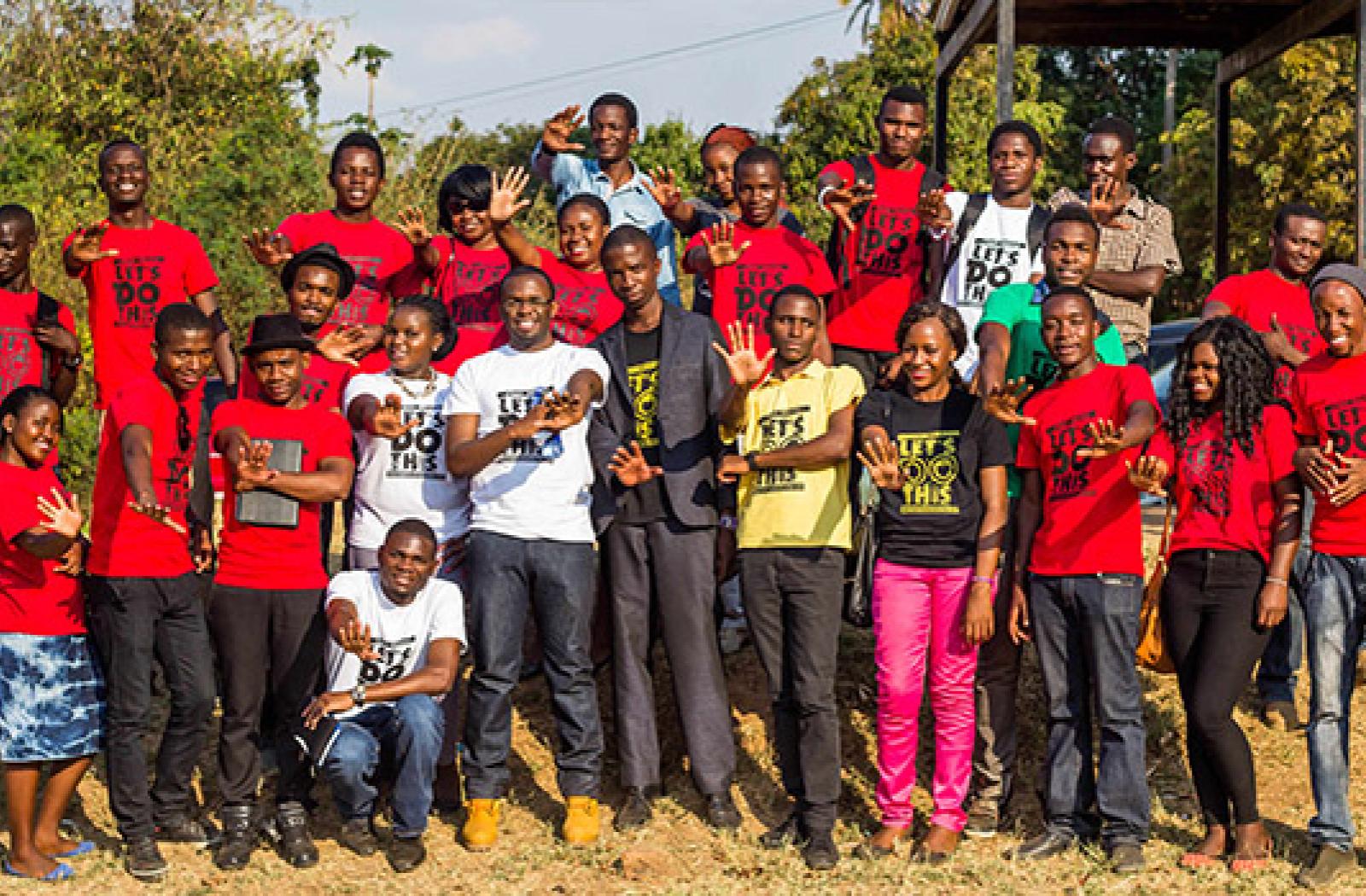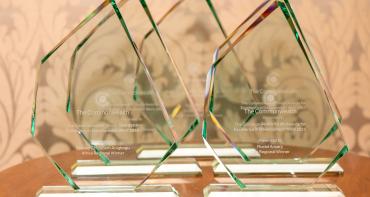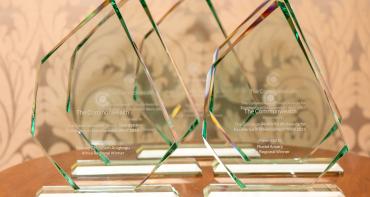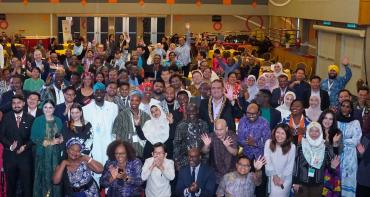Seventeen young change makers from 13 countries are in the running to be named Commonwealth Young Person of the Year at an awards ceremony held on 15 March at Marlborough House in London.

The founder of a youth-led organisation in Papua New Guinea that uses sport as a tool to end violence against women, and the owner of a Nigerian company which uses ‘geo-mapping’ to recycle waste, are among the finalists of the 2017 Commonwealth Youth Awards.
Seventeen young change makers from 13 countries are in the running to be named Commonwealth Young Person of the Year at an awards ceremony held on 15 March at Marlborough House in London.
The Commonwealth Youth Awards for Excellence in Development Work celebrate outstanding adolescents and young adults aged 15–29 from Asia, the Pacific, the Caribbean and Americas, Africa and Europe, who are leading initiatives ranging from poverty alleviation to peace-building.
This year’s group of finalists are recognised for spearheading projects that will contribute to the Sustainable Development Goals – a set of 17 global targets that governments have committed to achieve by 2030.
Katherine Ellis, Director of Youth at the Commonwealth Secretariat, said, “Through their own initiative, young leaders in communities across the world are delivering on the ambitious agenda set by governments on everything from eliminating hunger to protecting the environment.
“All of the outstanding finalists recognised today have demonstrated that young people are central to bringing forward positive change. Through these awards, we seek to celebrate their achievements and inspire others to follow in their footsteps, and encourage high level support for youth-led development efforts.”
The finalists were chosen by a panel of judges including representatives of Commonwealth High Commissions, Commonwealth organisations and young leaders. The Commonwealth Young Person of the Year will be announced on 15 March alongside regional young persons of the year for Asia, the Pacific, the Caribbean and Americas, Africa and Europe.
The shortlisted finalists hail from Australia, Bangladesh, Canada, Guyana, Jamaica, Malawi, Nigeria, Pakistan, Papua New Guinea, Sri Lanka, Saint Vincent and The Grenadines, Uganda and United Kingdom.
One of the judges, Angelique Pouponneau, Vice-Chair of the Commonwealth Youth Council, commented that “each of the youth awardees’ stories has brought inspiration and faith that today and tomorrow are in good hands with young people as equal partners of development.”
The shortlisted finalists are:
AFRICA and EUROPE
Malawi - Charles Lipenga
Charles established the Maestros Leadership Team, a youth-led organisation. Together with a team of Maestros, he helped to train more than 10,000 young people who joined a ‘Let’s Do This’ campaign with volunteers across Malawi and 22 other countries. Through the organisation, Charles led an initiative called Project Inspired that raised funds for 1,000 student scholarships and also adopted a government secondary school in Blantyre, Malawi. Maestros Leadership Teams are now established in nine universities within Malawi alone with over 20,000 students participating.
Sustainable Development Goal 4: Quality Education
Nigeria - Charles Immanuel Akhimien and Owobi Emmanuel
Charles and Owobi are the co-founders of MOBicure, a social enterprise that provides mobile technology solutions in healthcare for maternal and child health. They created ‘OMOMI’, a mobile platform consisting of an app and an SMS service that enables pregnant women and mothers to access maternal and child health information at the touch of a button. Over 17,000 mothers have benefitted from the platform.
Sustainable Development Goal 10: Reduced Inequalities
Nigeria - Destiny Frederick
Destiny founded EcoFuture, a waste recovery company which uses smart sensor waste bins, SMS and geo-mapping to collect recyclable waste from households, companies and governments. In two years EcoFuture has registered over 1,000 households and businesses, established a collection service, built 15 operational smart sensor waste bins and collected over 200 metric tonnes of recyclable materials.
Sustainable Development Goal 11: Sustainable Cities and Communities
Uganda - Charles Batte
Charles founded Empower Community Farm to create employment opportunities and demonstrate smart climate agriculture practices in Uganda. He established Tree Adoption Uganda, which is a youth-led NGO that addresses youth unemployment and climate change. It does this through a Tree Capital programme that encourages companies to offset carbon emissions through planting trees while also supporting youth employment. Over the next three years Charles hopes to restore 100,000 hectares of deforested land and employ 20,000 youth to plant the trees.
Sustainable Development Goal 13: Climate Action
United Kingdom - Jonathan Andrews
Jonathan led a national initiative in the United Kingdom to reduce inequality by creating and opening up jobs to autistic people. An autistic person himself, his advocacy work has linked autistic job searchers to job-searching services such as those run by the National Autistic Society, and helped with practical interview training. Combined these initiatives have reached over 10,000 people.
Sustainable Development Goal 3: Good Health and Well-Being
United Kingdom - Yentyl Williams
Yentyl is the founder of the African Caribbean and Pacific Young Professionals Network (ACP YPN), which aims to empower young people to take an active role in policy-making processes. She created a platform bringing together young people to mainstream youth perspectives in the European Parliament and has helped to bridge the gap between international institutions (European Parliament and European Council), diplomats (ACP Ambassadors) and youth organisations.
Sustainable Development Goal 16: Peace, Justice and Strong Institutions
PACIFIC
Australia - Michael Sheldrick
Michael is part of the leadership team of the international advocacy group Global Citizen’s campaign to achieve the Sustainable Development Goals. The group provides a platform for young people to hold governments accountable on delivering the goals. Since 2012, global citizens have taken more than 7.8 million actions leading to pledges from governments worth more than $27 billion.
Sustainable Development Goal 3: Good Health and Well-Being
Papua New Guinea - Jacqueline Joseph
Jacqueline is the co-founder of Equal Playing Field, a not-for-profit organisation that uses sport as a tool to prevent violence against women and children and promote gender equality in schools. She created Equal Playing Field for School (EPF4S), an eight-week respectful relationships programme that uses sport to engage with adolescent boys and girls. Through the programme, Jacqueline educates around two thousand 13- to 15-year-old girls and boys in schools in Port Moresby each year about the importance of respectful relationships as a way to reduce family and sexual violence.
Sustainable Development Goal 5: Gender Equality
Papua New Guinea - Raylance Mesa
Raylance is an architect working to promote quality education for rural schools while also building critical infrastructure such as libraries, schools and housing for teachers. She also led awareness raising campaigns on climate change resulting in island communities building sea walls constructed from dead coral reefs, coconut trunks and logs.
Sustainable Development Goal 4: Quality Education
ASIA
Bangladesh - Towfique Ahmad Khan
Towfique is a social entrepreneur who founded the South Asian Society and launched the ‘Girls for Global Goals’ campaign. His work has empowered 600 young girls with knowledge about the Sustainable Development Goals. This led to 4,500 volunteers organising more than 500 programmes and projects. He also promoted the campaign ‘Know your SDGs’ to raise awareness and reached out to 42,000 young people.
Sustainable Development Goal 5: Gender Equality
Bangladesh - Ukhengching Marma
Ukhengching runs the Menstruation Hygiene Campaign, an intervention programme aimed at empowering indigenous adolescent girls to live healthier lives. She has been able to reach out to around 700 girls to raise awareness about sexual and reproductive health and rights.
Sustainable Development Goal 6: Clean Water and Sanitation
Pakistan - Hadiqa Bashir
Hadiqa, aged 15, campaigns against early and forced marriages in tribal regions of Pakistan, including swara, a cultural practice in which young girls are married to elder persons. She works with legislators and religious leaders, engaging with civil society organisations and led public demonstrations and protests to raise awareness of the importance of ending early and forced marriages.
Sustainable Development Goal 10: Reduced Inequalities
Sri Lanka - Krystle Reid
Krystle is part of a group training disabled young people to enable them to secure employment and become self-sufficient. She founded the Enable Lanka Foundation which aims to break stereotypes and stigma among young women and other marginalised young people. Krystle introduced an incubator space for young entrepreneurs with disabilities and a mobile application of audio books to local universities and school students. These programmes have impacted over 50,000 persons with disabilities through community-driven economic empowerment courses.
Sustainable Development Goal 10: Reduced Inequalities
CARIBBEAN and AMERICAS
Canada - Ishita Aggarwal
Ishita has encouraged greater gender diversity in science and medicine, commerce and technology, engineering and mathematics, helping to promote women’s access to and advancement in these industries. She organised a national leadership conference to encourage girls in science, technology, engineering and mathematics: She founded Science for Girls, an initiative to celebrate women scientists and advocate for gender equality; it has so far raised $300,000 and inspired more than 60 young women to apply and take up science courses at university.
Sustainable Development Goal 5: Gender Equality
Guyana - Tricia Teekah
Tricia co-founded the Guyana National Youth Council and led the ‘Vote Like a Boss’ campaign, a youth voter education initiative which used private sector partnerships to educate young voters. The campaign reached more than 16,000 young people within a month and more than 1,300 young people participated in an online geo-mapping exercise on issues of concern to voters.
Sustainable Development Goal 16: Peace, Justice and Strong Institutions
Jamaica - Michelle Thomas
Michelle founded a ‘No Crime Movement’ that provides a platform to build support for a society based on respect for human rights. The project targets over 3,000 young people including women who were subjected to sexual abuse, young people who are in prison, and those living with disabilities, as well as lesbian, gay, bisexual and trans people (LGBT) youth. Her work emphasises an increase in citizen involvement and community-level policing.
Sustainable Development Goal 16: Peace, Justice and Strong Institutions
Saint Vincent and The Grenadines - R. Tamira L.V. Browne
Tamira was nominated by the Girl Guides Association of SVG to serve as the CARICOM Youth Ambassador (CYA) for Saint Vincent and The Grenadines. She participated in a financial literacy training-of-trainers programme organised by the Commonwealth Secretariat in The Bahamas. Following the programme she trained 120 young people recruited in a youth empowerment service programme in the Girl Guides Association. She also developed a series of guides on entrepreneurship and empowerment.
Sustainable Development Goal 8: Decent Work and Economic Growth
Live video stream from 11.00 GMT Wednesday 15 March
Trouble viewing? Watch the event on Youtube
Notes to Editors
Media Contact:
Will Henley
Senior Communications Officer
Commonwealth Secretariat
Email: [email protected]



